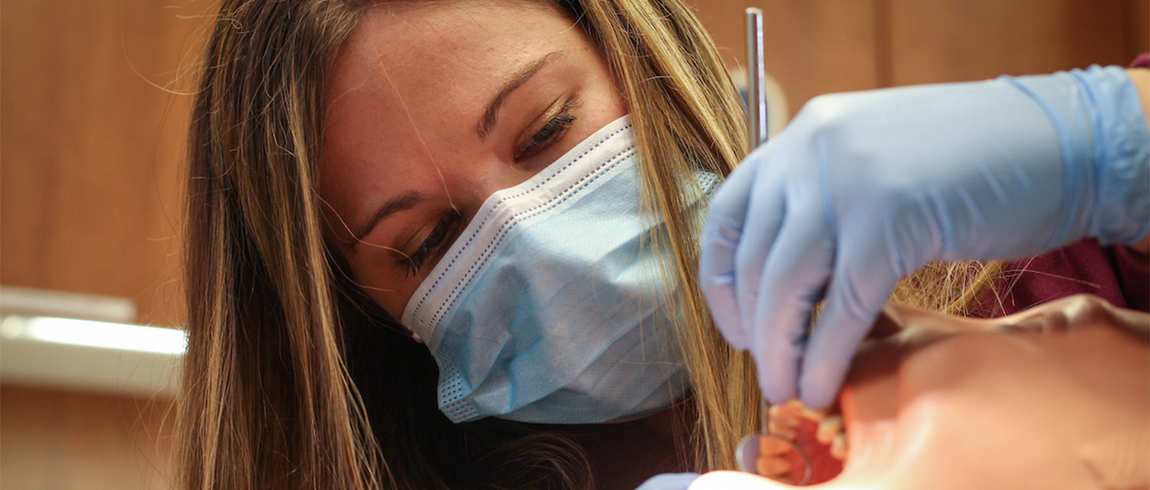Dental assisting program uses flexible schedule to help students, address growing industry need
After injuring her shoulder after a drunk driver hit her car in 2017, Emily Mokwa feared that her impending surgery signaled a halt to her college career.
"After my surgery, I wasn't able to come to class in the mornings because that was when the pain was worse for me," she said. "Having flexible hours throughout the day made it so much easier to continue at my own pace without having to withdraw from the classroom."
Mokwa, entering her final semester as a student this fall in Lake Michigan College's registered dental assisting program, credits the open-lab format, with keeping her education on track.
"It has been a life-saver," Mokwa said. "And not just after my accident. I am a full-time student, but I also have a full-time job. Having that flexibility, I can pay my bills and still go to college."
The flexibility of the LMC program, which includes day and evening hours at both its Niles and Benton Harbor campuses, is designed not only for students like Mokwa but for professionals already working in the industry.
"There is a big push in Michigan to increase the number of registered dental assistants," said Maryann McCarthy, a member of LMC's dental assisting faculty and the interim program chair. "There are a lot of on-the-job-trained assistants out there who have phenomenal skills, but they don't have that license that gives them the ability to do more. Having that flexible schedule and evening classes allows someone already working in an office to come in and finish the coursework for the state board exam."
The need for registered dental assistants is growing. The country's aging population paired with ongoing research linking oral and general health continues to increase the demand for preventive dental services. According to the most recent Bureau of Labor Statistics, employment for registered dental assistants is expected to grow 19 percent through 2026, much faster than average for all occupations.
Because of such projections, some higher-education institutions now have waitlists for their dental hygienist programs, which requires additional training. Dental assistant programs, however, like the one offered at LMC, can get students into the field at a faster pace.
Although they sound similar, the two positions aren't interchangeable. Dental hygienists clean teeth, examine patients for signs of oral diseases such as gingivitis and provide other preventive dental care. Dental assistants perform a variety of patient care, as well as office and laboratory duties. Dental assistants are most often the ones who work chair-side as dentists examine and treat patients.
"We are the one with you the entire time," said McCarthy, who worked as a dental assistant for 30 years before joining LMC. "We are the dentist's right hand. They really can't work without us. I mean, they can, but they don't do it very well!"
LMC offers an open lab format for both its dental assisting advance certificate and dental assisting Associate in Applied Science degree accredited by the Commission on Dental Accreditation of the American Dental Association.
"Typically, we have two instructors in the dental lab at a time," McCarthy said. "Students work at their own pace, and instructors are there to guide them, do demonstrations, of course, test with them, and have hands-on testing of different skills. Students like our program because instructors do not stand in front of the class and lecture. All the instructors have worked in the field. They've all been dental assistants or hygienists for years, so they have that knowledge to pass along."
Both the Niles and Benton Harbor labs are set up like dental offices with the latest dental assisting training tools and technology. There are practice manikins, computer work stations, digital radiography devices, and VELscopes, which use natural tissue fluorescence to detect abnormalities such as oral cancer.
"Hands-on is how I learn best and the fact that there are dental stations in the program where we can practice, makes it so much easier," Mokwa said. "I've learned so much from my instructors. They are just amazing people."
McCarthy said she and the rest of the faculty also try to pass on their passion for the industry itself.
"I loved being a dental assistant, and honestly, I didn't think I would," she said. "I thought it was something I would do for a couple of years, and then I would find something else. Thirty-some years later, I still love it. My favorite thing is the patients. Maybe they came in feeling a little nervous, and you can give them this great smile, and they leave so excited. I mean, to see a kid's reaction to their braces coming off is just the best."



